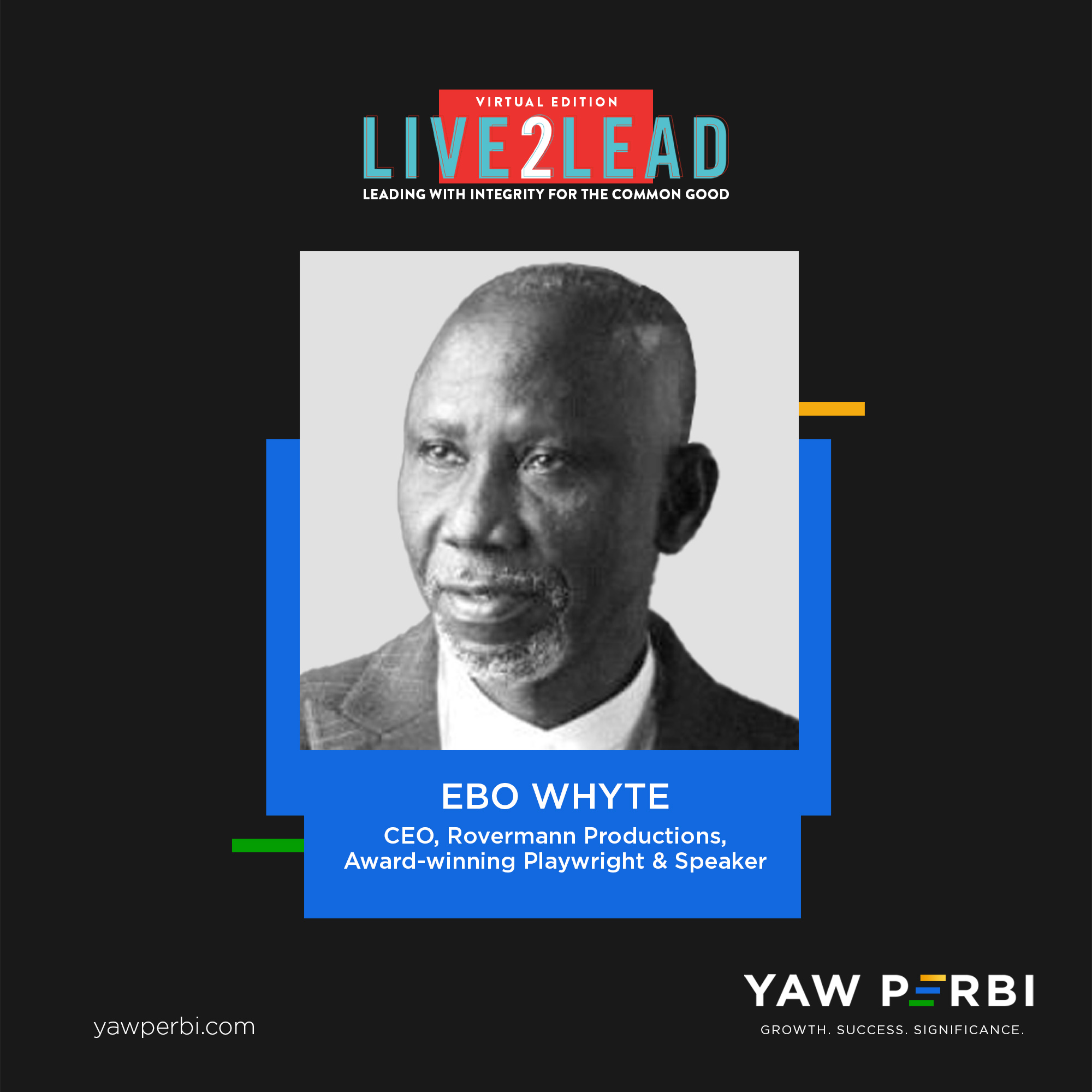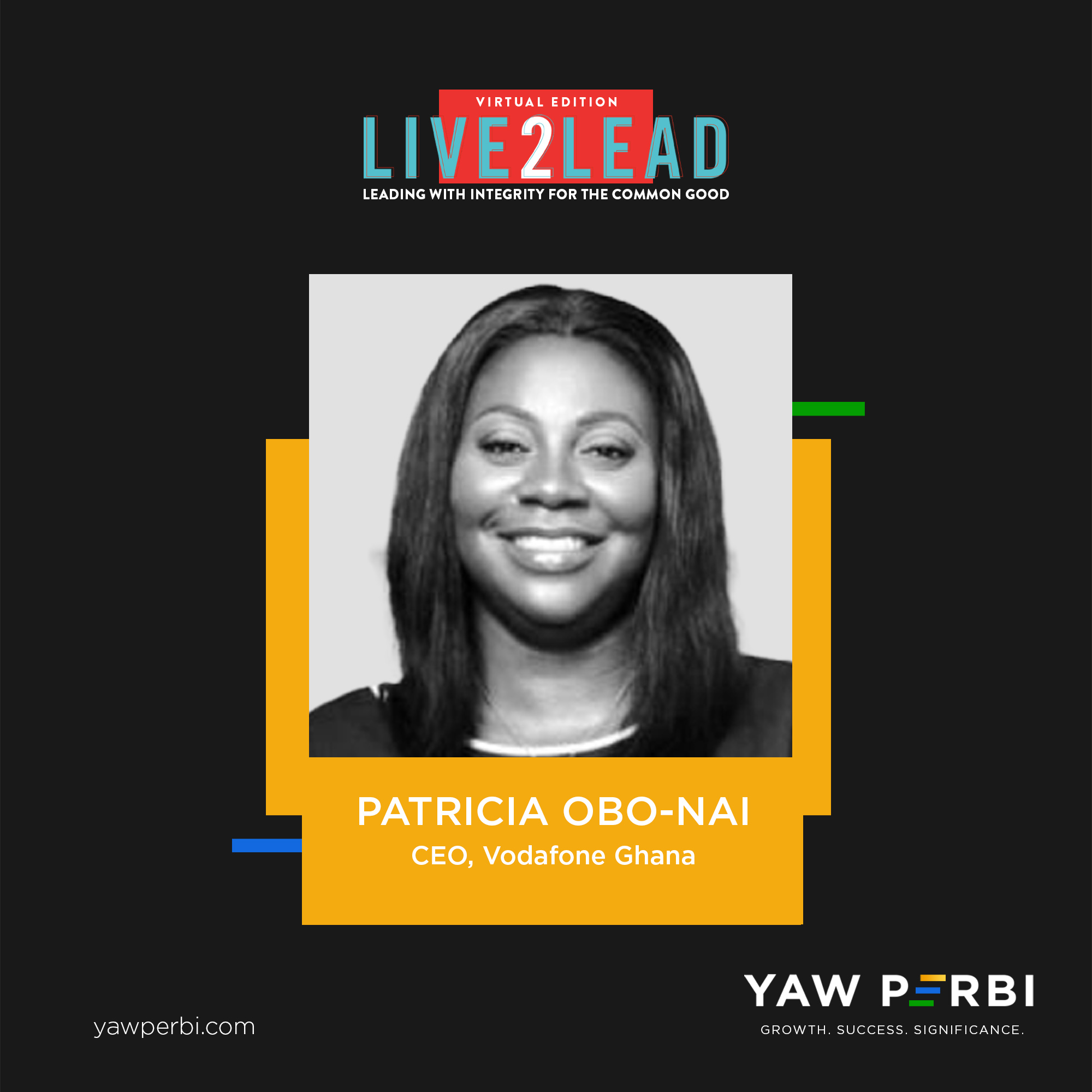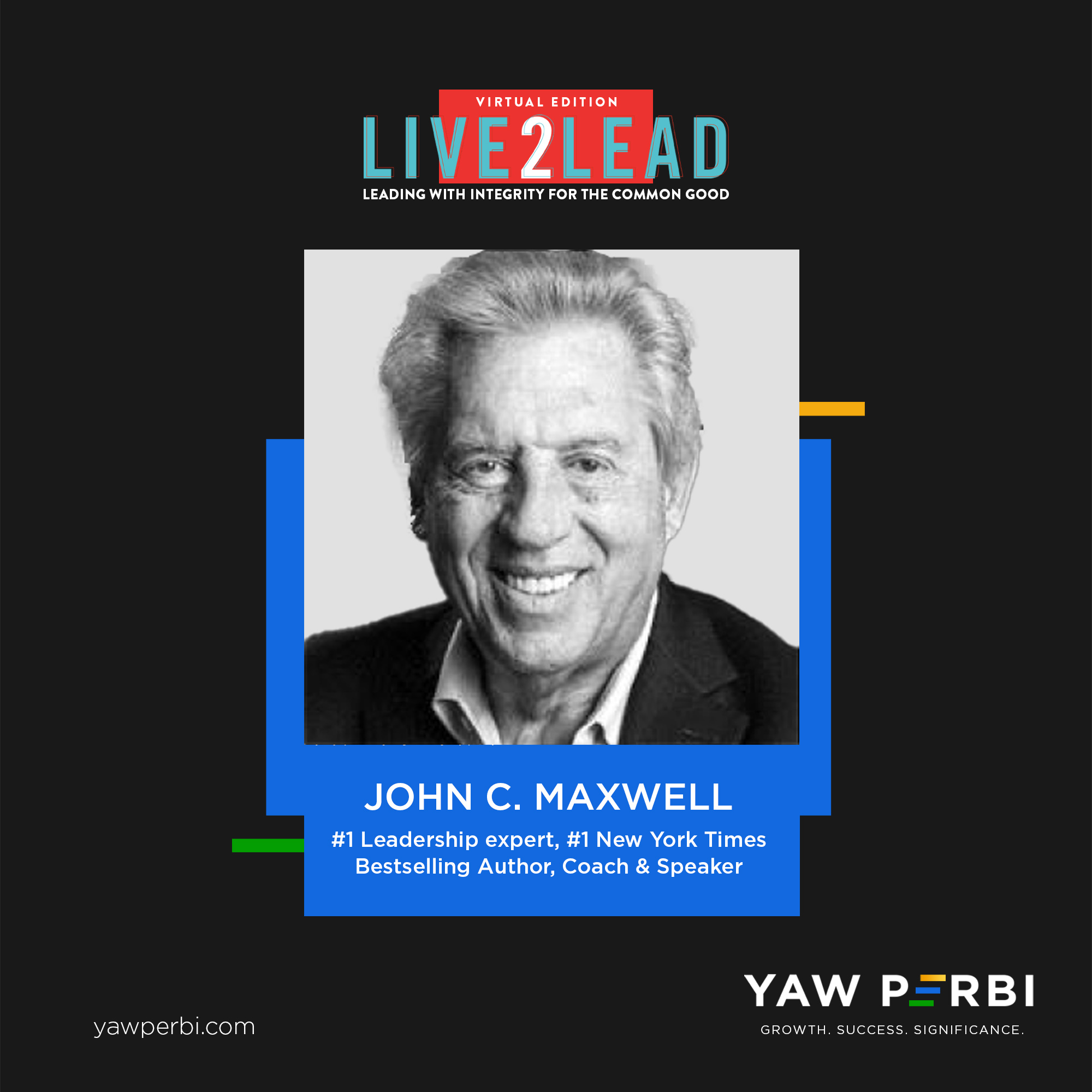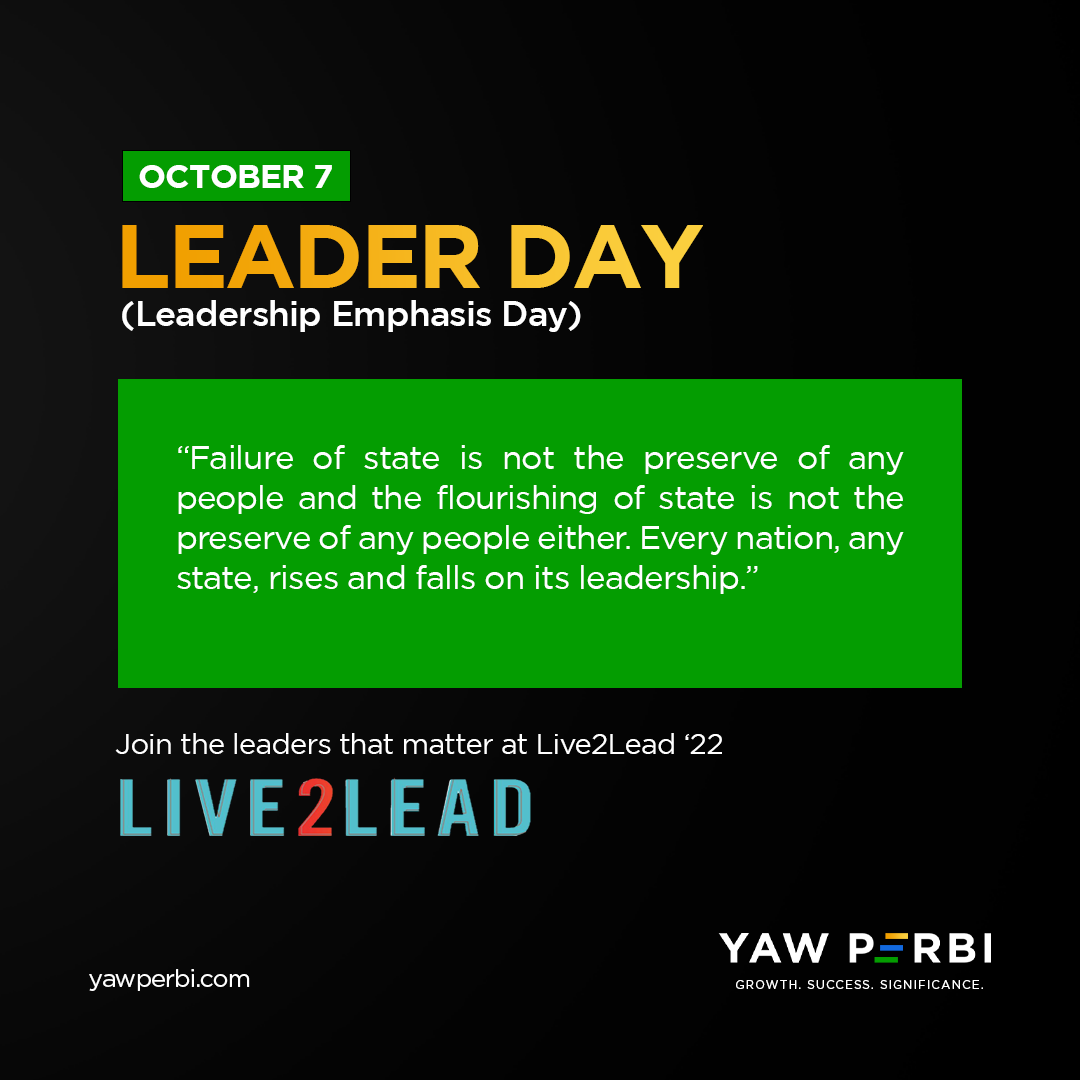
Meet Uncle Ebo, the People’s Uncle.
Everyone calls him “Uncle” without even thinking twice about it. Whether young enough to be their son or old enough to be their grandpa, “Uncle” is everyone’s uncle. A voice of reason, counsel in season, James Ebo Whyte, affectionately known nationwide as “Uncle Ebo” is the people’s uncle, hands down.
Mr. James Ebo Whyte is the CEO, heart and brain behind Roverman Productions. He is nationally acknowledged as an accomplished, award-winning playwright and highly sought-after motivational speaker. James Ebo Whyte constantly challenges Ghanaians to think more about the world they live in and the contribution they make to it. Just the day before the October 7, 2022 Live2Lead conference at which he was speaking, he unveiled to his drama troupe his 51st play in fourteen years! A hearty congratulations to the prolific playwright.
INTEGRITY IN THE ARTS & ENTERTAINMENT INDUSTRY
At Live2Lead 2022, Uncle Ebo was the only gentleman among three distinguished leading ladies from the corporate and entrepreneurship spaces as well as the public sector. Their first job was to respond to the submissions on “Leading with Integrity for the Common Good” made in the earlier hour by Patrick Awuah, founder and president of Ashesi University. Uncle Ebo held our attention as he raised issues of integrity in the arts & entertainment segment of Ghanaian society that he had with intentionality decided to counter, like giving kickbacks from corporate sponsorship. He uttered with conviction, “there are sponsorships we know we’ll never get for our plays because of this.” And he’s fine with it, as he knows that integrity comes at a cost.
One of the most amazing feats of Roverman Productions has been putting up a new play every quarter for the last decade-and-a-half and resolving to always start on time, also a matter of integrity. In fact, one of the participants at Live2Lead, a corporate governance expert, interjected that one reason she chooses to go and see Ebo Whyte’s plays is that she can guarantee they would commence on time. Again, Roverman has gone against the tide by ensuring pristine toilet facilities at their play venues and three levels of security at events to ensure patrons have a heavenly experience and leave with no bitter taste in their mouths. To the people’s uncle, excellence in these areas is a matter of integrity.
OF TEENAGE FOLLY AND GAMBLING
We intentionally wanted to leave the Live2Lead conferees on a note of hope, especially hope in Ghana, and Uncle Ebo did not disappoint. While admitting we have mega challenges in the nation he reminds us that we’ve not only been in worse times but also that in the annals of nation building globally, at 60 years Ghana is only a teenager. The national happenings that leave us in consternation are akin to teenage tantrums and this too shall pass. We do have quite a degree of national folly though, which we need to be cured of, he confesses.
Uncle Ebo’s belief in Ghana is so solid that his parting words were the following: “Whoever bets against Ghana will lose.” For a full buffet of this scintillating conversation look out for a recording of the hitherto livestreamed video (currently only available to paid participants) or invite Live2Lead to rebroadcast in your context (company, community, church etc). You don’t want to miss Live2Lead 2023 on October 6, next year, Deo volonte. Pinned on the first Friday of each October, National Leader Day after National Leader Day, building a leader at a time and one centre of excellence at a time, we shall surely get to the Ghana we want. And who knows? Perhaps sooner than other nations have.

Meet Eric Thomas, a Fireball to Light a Fire Under You!
Eric Thomas, Ph.D., is a critically acclaimed author, world-renowned speaker, educator, pastor, and audible.com Audie Awards finalist. ET, as he is better known and affectionately called, has taken the world by storm, with his creative, common-sense approach to living a successful, satisfying professional and personal life. Through a significant social media presence and regular domestic and international tours, “ET, The Hip Hop Preacher” has become a global phenomenon!
As CEO of his Consulting Firm, ETA LLC., Dr. Eric Thomas has led his team through the doors of dozens of hugely successful organizations and Fortune 500 companies such as General Electric, Quicken Loans, AT&T, Nike, Under Armour, New Balance, and UPS and continues to consult for major league sports franchises within the MLB, NBA, NFL, MLS (various United States sports leagues).
YOU OWE YOU
That’s Eric’s philosophy of life, and his topic at Live2Lead on October 7: You Owe You: Ignite Your Power, Your Purpose, and Your Why. Come learn the key principles of how to turn a mentality of struggle into strength, resulting in enduring success. Eric Thomas shares his urgent message to stop waiting for inspiration to strike and take control of your life, using stories of his past and lessons learned as examples.
He will help identify how you can rewrite your life’s script and capture the attention of all kinds of people in a multitude of different environments. Sharing these critical first steps will help you with understanding yourself and the world around you, finding your why, accepting that you may have to give up something good for something great, and constantly stretching toward your potential.
Pump up your personal, professional and leadership game at this year’s Live2Lead conference. Register now through this link. Nag your organization until they join this rising movement of learning leaders that will transform society by becoming a Patron of Live2Lead. A Patron company is one that sends at least 10 leaders to Live2Lead, and this year they range from mining companies like Goldfields to banking greats like Stanchart. There’s no way we can have at least 100 such Patron organizations and companies in Ghana and not transform the nation, one leader at a time, one centre of excellence at a time. Together we can change our country and continent for the better! Let’s do this! Register here, and NOW.

Meet Patricia Obo-Nai, Telecom CEO of the Season.
Patricia Obo-Nai is one of the most influential CEOs in Africa, a leading figure in the telecom sector. Don’t let her cool fool you. It is not for nothing that she is not only the first ever female CEO of Vodafone Ghana but the first Ghanaian to do so. Period. Her outstanding leadership has been recognized by many, including Mobile Magazine Africa, which named her the “First Lady of Mobile in Africa.”
Patricia started her career as a Network Planning Engineer with Millicom Ghana Ltd. (Tigo) in 2000. She holds a BSc in Electrical/Electronic Engineering from the Kwame Nkrumah University of Science and Technology (KNUST) and an Executive MBA in Project Management from the University of Ghana Business School. Regarding international education, she holds executive education qualifications from both sides of the Atlantic, Kellogg School of Management in the USA and INSEAD in France. Patricia is passionate about the future of young people and women in the digital age and is a vigorous advocate for STEM. She has been on several platforms, including the UN General Assembly panel sessions, advocating for youth and women.
Among Mrs. Obo-Nai’s dozen plus prestigious awards are the recent Women Leadership Excellence Award at the Ghana CEO’s Network Summit and the Africa’s Most Respected CEO Awards in the continent’s Telecommunications Industry, both of 2021. She is a CEO of CEOs.
WHAT IS GOOD TECHNOLOGY WITHOUT GREAT VALUES!
Even before getting into the so-called ‘soft’ issues of leadership, like integrity, as an electrical engineer Pat knows the hard consequences of conductors, currents, circuits, capacitors and such that have no integrity. Nothing of enduring value happens without integrity. At the October 7 Live2Lead conference this year, Patricia will exhibit through her life and leadership how “the glue that holds all relationships together–including the relationship between the leader and the led–is trust, and trust is based on integrity” (Brian Tracy).
Mrs. Obo-Nai will share how she manages to lead with integrity for the common good despite the high corruption in Ghanaian society, everywhere one turns. During an April visit to Ashesi earlier this year, the celebrated CEO of Vodafone Ghana highlighted lessons from her 20-year career. Embedded in those gems was a reminder to students about the importance of having integrity.
Tune up your personal, professional and leadership game at this year’s Live2Lead conference. Register now through this link. Nag your organization until they join this rising movement of learning leaders that will transform society by becoming a Patron of Live2Lead. A Patron company, like Patricia’s own Vodafone, is one that sends at least 10 leaders to Live2Lead. There’s no way we can have at least 100 such Patron organizations and companies in Ghana and not transform the nation, one centre of excellence at a time. Together we can change our country and continent for the better! Let’s do this! Register here, and NOW.

Meet Tim Elmore, Intergenerational Leader of Leaders.
Dr. Tim Elmore’s passion for leader development began in 1983 when he worked alongside and was mentored by best-selling author, Dr. John C. Maxwell. Since then, he’s emerged as an author, leadership expert, and keynote speaker who’s trained more than 500,000 leaders in hundreds of organizations worldwide. Speaking of intergenerational leadership, he’s also the Founder and CEO of Growing Leaders, a non-profit team that equips students and young professionals around the world to become life-giving leaders. Tim has developed young leaders on every continent and has spoken in 50 countries including India, Russia, China, Brazil and throughout the Middle East.
Dr. Elmore has advised corporations such as Chick-fil-A, Cox Communications, the Home Depot, Cici’s Pizza, Delta Global, Coca-Cola Consolidated, and more. He’s spoken at top-tier universities such as Stanford, Texas, Duke, Ohio State, Georgia Tech, U.C. Berkeley and more. And he’s presented to executives and world-class athletes with the Kansas City Royals, New York Giants, Houston Rockets, and San Francisco Giants. His blog is read by over 100,000 people weekly.
THE INTERGENERATIONAL WORKPLACE OF THE 21ST CENTURY
At Live2Lead on October 7, come hear how Tim brings his decades of research and leadership experience to bear on what might be the biggest, most dramatic, and most disruptive shift the workforce has ever seen: the vast diversity of several generations living—and working—together. Tim Elmore explores the fact that for the first time in history, up to five generations find themselves working alongside each other in a typical company. The result? There can be division. Interactions between people from different generations can resemble a cross-cultural relationship. Both usually possess different values and customs. At times, each generation is literally speaking a different language!
How can we hope to work together when we can’t even understand each other? Tim will provide the tools to:
- Get the most out of the strengths of each age group on your team.
- Foster effective communication instead of isolation among people.
- Build bridges rather than walls so that loneliness becomes connectedness.
- Connect people to learn how both veterans and rookies can mentor each other.
ADD VALUE TO YOU AND YOURS
At YAW PERBI Executive Leadership Education all our offerings are to the end that leaders grow personally, succeed professionally and become significant societally. Join Dr. Tim Elmore and the other stellar faculty Dr. John Maxwell has put together for this year’s Live2Lead conference and tune up your leadership game. Register now through this link. Impress upon your organization to join the movement that will transform society by becoming a Patron of Live2Lead. A Patron company or individual is one that sends at least 10 leaders to Live2Lead. Together we can change our world for the better!
Register HERE, NOW.

Meet Gwyneth Gyimah Addo, a Sight for Sore Eyes.
Gwyneth Gyimah Addo, often affectionately called Gwen, is a wife, mother, author, philanthropist, business leader, motivational speaker, marketing strategist and the CEO of Ghana’s leading human hair company, The Hair Senta.
After graduating from the University of Ghana, Gwen joined Standard Chartered Bank Ghana for six years. She holds an MBA in entrepreneurship and innovation from the China Europe International Business School (CEIBS) as well as an Executive Management qualification from Harvard Business School. Gwen was recently featured in a Forbes Africa interview on the global market boom of hair extensions and wigs. Her many awards include CEIBS Global Impact Award, CEIBS Most Promising Female Entrepreneur Award, and the 40 Under 40 Sales and Marketing Award.
Gwen founded the mega HIBS AFRICA global event to project the beauty industry on the continent and the Leading Senta Foundation which focuses on mentoring youth. Her first book, DIRECTION, is already creating impact in the lives of many young and adult readers. Her love, commitment, reliance and trust in the Lord is unquestionably the pivot around which her business success revolves.
WHAT YOU SEE IS WHAT YOU GET
It is hard not to like Gwen. She is absolutely winsome and authentic–what you see is what you get. This largely accounts for her over 100,000 following on Instagram, the social media platform on which she has virtually built her business. Finding high level leaders in Ghana who embody this year’s Live2Lead theme of “Leading with Integrity for the Common Good” has not been easy. Many crowd-pulling speakers did not seem to fit the bill, if we were going to be serious about walking the talk. It has been heartwarming to get to know Gwen personally, upon high recommendation from my network, and to find her a leader of integrity. The icing on the cake, for me, was to expressly read from her new book, DIRECTION, how integrity is a non-negotiable for her and the multi-million dollar business she heads.
On October 7 this year, Gwen will share her views on leadership and integrity and how she manages to remain authentic in a cut-throat society. Mrs. Gwyneth Gyimah Addo is a sight for sore eyes, literally and figuratively. Friends, we are going nowhere without integrity. For in the words of Zig Ziglar, “It is true that integrity alone won’t make you a leader, but without integrity you will never be one.”
Tune up your personal, professional and leadership game at this year’s Live2Lead conference. Register now through this link. Nag your organization until they join this rising movement of learning leaders that will transform society by becoming a Patron of Live2Lead. A Patron company or individual is one that sends at least 10 leaders to Live2Lead. There’s no way we can have at least 100 such Patron organizations and companies in Ghana and not transform it, one centre of excellence at a time. Together we can change our country and continent for the better! Let’s do this! Register here, NOW.

Meet Doris Kearns Goodwin, Presidential Historian Extraordinaire
Doris Helen Kearns Goodwin is an American biographer, historian, former sports journalist, and political commentator. In 1964 Kearns received a bachelor’s degree from Colby College, Waterville, Maine, and in 1968 she earned a doctorate in government from Harvard University, where she later taught government.
Goodwin won the 1995 Pulitzer Prize in history for her No Ordinary Time: Franklin and Eleanor Roosevelt: The Home Front in World War II (1994), and in 2005 she published Team of Rivals: The Political Genius of Abraham Lincoln, which focused on Lincoln’s management of his presidential cabinet. The book served as the primary source for Steven Spielberg’s biographical film Lincoln (2012). She later wrote The Bully Pulpit: Theodore Roosevelt, William Howard Taft, and the Golden Age of Journalism (2013) and Leadership in Turbulent Times (2018). In addition to her works of presidential scholarship, Goodwin wrote Wait till Next Year: A Memoir (1997), about growing up in the 1950s and her love for the Brooklyn Dodgers. She also served as a news analyst for NBC and as a consultant for Ken Burns’s documentary Baseball (1994).
TO LEARN OR NOT TO LEARN
It breaks my heart when I hear a famous statement like, “The only thing that we learn from history is that we learn nothing from history” (Georg Hegel, German philosopher). Yet of a truth, “Those who do not learn history are doomed to repeat it.” That quote is most likely writer and philosopher George Santayana’s, and its original form read, “Those who cannot remember the past are condemned to repeat it.” While leaders must not live the past, they certainly must leverage its lessons for today and tomorrow.
Consequently, in a fireside chat with John C. Maxwell at Live2Lead on October 7 this year, Doris will share key leadership insights gleaned from her decades of experience as a presidential historian, public speaker and Pulitzer-Prize winning author. The leadership lessons learned from some of the greatest leaders in our history provide timely clues on how to navigate the current condition of the leadership deficit we are experiencing today.
Come and up your personal, professional and leadership game at this year’s Live2Lead conference. Register now through this link. Nag your organization until they join this rising movement of learning leaders that will transform society by becoming a Patron of Live2Lead. A Patron company or individual is one that sends at least 10 leaders to Live2Lead. There’s no way we can have at least 100 such Patron organizations and companies in Ghana and not transform it, one centre of excellence at a time. Together we can change our country and continent for the better! Let’s do this! Register HERE, NOW.

Meet Patrick Awuah, Trailblazer in International Education Brewed in an African Pot
Last Friday, I spent some time with friend, mentor and fellow African Leadership Initiative/Aspen Global Leadership Network Fellow, Patrick Awuah Jr. It was a joy to see and hear afresh his commitment to the cause of leadership development on the continent of Africa. And this personal pledge is to the extent that he will be excusing himself from a crucial Ashesi University board meeting to address the leaders virtually gathered at Live2Lead and then dive right back into the governance matters of this leading African establishment.
Patrick Awuah is a Ghanaian engineer, educator, and entrepreneur. Patrick founded Ashesi University in 2002. Dr. Awuah, with three honorary doctorates (Swarthmore College 2004, Babson College 2013, University of Waterloo 2018) to his name, has won numerous other awards as an individual and as the founder of Ashesi University. He was presented with the Order of the Volta Award to recognize his contribution to tertiary education in Ghana in 2007. In 2009, Awuah won the John P. McNulty Prize. In 2010, Awuah was awarded 87th most creative businessperson by Fast Company. In 2014, he received The Elise and Walter A. Haas International Award, which honours UC Berkeley alumni with distinguished records of service to their native country. In the same year, he was named best social entrepreneur by the Schwab Foundation for Social Entrepreneurship. In 2015, Awuah was listed by Fortune as number 40 in world’s 50 greatest leaders and was awarded a MacArthur Fellowship. In 2017, Awuah was awarded the World Innovation Summit for Education (WISE) prize, a major global education award.
INTEGRITY IN LEADERSHIP FOR THE COMMON GOOD
”INTEGRITY” is an often-used but little understood (and even less practiced) word in Ghana today. Patrick will be the keynote speaker on the theme for this year’s Live2Lead, “Leading with Integrity for the Common Good.” Ashesi has a fascinating story about an honour code and how its implementation nearly jeopardized Ashesi’s accreditation process. This tale has everything to do with instilling integrity, and for those of you who are not privy to the terrific tale, we shall be impressing upon Patrick to share “from the horse’s own mouth.”
Patrick will address what integrity actually means and share practical examples where he’s led with integrity and times his integrity has been challenged. Dr. Awuah will practically tip all and sundry on how integrity is taken off the wall and printed in hearts and minds on four levels: (1) personally (2) as teams (3) organisation-wide and (4) nationally.
You don’t want to miss Patrick Awuah’s fireside chat session at Live2Lead Ghana 2022. Grab your seat right here right now.

Meet John Maxwell, Mentor Emeritus
No single individual has influenced my leadership paradigm and praxis like Dr. John C. Maxwell. I started reading and understudying John in the late 1990s and have been teaching his materials ever since, both as a bonafide EQUIP trainer and a certified Maxwell coach/speaker/trainer on the John Maxwell Team (JMT).
Meet John Maxwell–my mentor emeritus–the #1 New York Times bestselling author, coach, and speaker who has sold more than 30 million books. John has been identified as the #1 leader in business by the American Management Association® and the world’s most influential leadership expert by Business Insider and Inc. magazines.
Dr. Maxwell has also received the Horatio Alger Award, as well as the Mother Teresa Prize for Global Peace and Leadership from the Luminary Leadership Network. His organizations—The John Maxwell Company, The John Maxwell Team, EQUIP, and the John Maxwell Leadership Foundation—have trained millions of leaders from every nation in the world.
The annual Live2Lead conference is John’s brainchild, and he always opens and closes, with other phenomenal faculty sandwiched in between. I have been privileged to host it on both sides of the Atlantic, in Montreal, Canada as well as Accra, Ghana.
LAWS OF COMMUNICATION AND LIMITS-BLOWING CONTENT
At Live2Lead this year, John C. Maxwell will be sharing new content from his upcoming book on the 16 Laws of Communication. Maxwell explains how to identify, grow, and apply your critical capacities. Once you’ve blow the “cap” of your capacities, you’ll find yourself more successful in your daily life.
We are absolutely convinced at YAW PERBI Executive Leadership Education that leadership (including communication) is taught; not just caught. Join John and the stellar faculty he’s put together for this year’s Live2Lead conference and up your leadership game. Register now through this link. Impress upon your organization to join the movement that will transform society by becoming a Patron of Live2Lead. A Patron company or individual is one that sends at least 10 leaders to Live2Lead. Together we can change our world for the better!
Register HERE, NOW.

Raise the Roof, Lift your Lid!
I just arrived at my room in Cape Town after three flights from Accra to Nairobi, Nairobi to Johannesburg and Jo’burg to Cape Town. A question on my mind as l flew here far above sea level, sometimes as high as 38,000 feet, has been, “How high is your leadership lid?”
THE FIRST OF THE IRREFUTABLE LAWS OF LEADERSHIP
Of course you know what a lid is, the cover of a container. How high your lid is determines the quality of the leadership that you provide for those you lead. I learnt this a long time ago, some 20-25 years ago from John Maxwell’s 21 Irrefutable Laws of Leadership. It was the very first of the principles of leadership he espoused in that bestseller and my life has never been the same since.
As John challenged me then from the written word—and many years later in-person—I must always endeavour to lift my leadership lid because no family, organization, church, community or country would ever grow past their leader. The leader is the lid over those (s)he leads. Sometimes when training leaders I ask, “are you a leader or ‘lidder’? because a leader is literally the lid on the progress and prosperity of their constituency. In a sense, every leader is a lidder; the question is “how high?”
IMAGINE THIS PRESIDENTIAL LID
You probably have heard me tell the story of a certain African president that a group of us, Maxwell certified leaders, were trying to connect in-person to John C. Maxwell for a national transformation process and programme. This president had never heard of John. In all probability, he hadn’t read any other contemporary leadership experts but hopefully he has digested at the very minimum some of the leadership classics like Plato’s, ‘The Republic’. It is a scary thought that this African nation—and by extension every family, organization, corporation, community, church etc. within her—would be constrained by the tightness of this head of state’s lid. I almost added, “through no fault of theirs,” but I guess they voted him into power.
HOW TO LIFT YOURS
While we educate a new generation that should be too enlightened to allow such tight lidders to lead African nations in the next decade, let me ask you, let’s get personal: how high is your lid? We forget, many of us (or we might even not know), that leadership is not just caught, it must be taught. And that’s why I love the opportunity, come October 07, for us all to be part of a life-altering, lid-lifting Live2Lead virtual experience with local faculty and global ones beaming all the way from Atlanta, Georgia.
We are gunning for 2,000 leaders—from emerging (youth) leaders, through leaders in the establishment (i.e. government/public sector leaders) to established leaders in the private sector, including executives from the corporate space. We will be taught in word and deed by powerful speakers and shakers like John C. Maxwell himself, two Patricks (Lencioni of the USA and Awuah of Ghana) and a Patricia (CEO of Vodafone, Ghana).
RAISE THE ROOF!
One of the most powerful discoveries in psychology over the last generation has been that people can learn and grow and change! So wherever your lid is today, if you learn to lead better you provide more room for those you lead. John will be the first to tell you that “your capacity determines your impact.”
Perhaps, some of the conflicts you are experiencing right now in your organization, church or wherever you lead is because your lid is too low and so people keep hitting it. And there is going to be continued tension and banging (conflict) till at some either you leave the stage or your people take their exit. As you have probably heard it said, people join organizations but they leave people (managers/leaders). It’s time to make room, lift your lid, raise the roof!
I have been part of things l left because the lid was too low. It just wasn’t life giving and l know people have also left my leadership when my lid was low because it was just too tight. Learn to lead. Each one of us can learn to lead better. Blow off the lid so that all of a sudden the people under your leadership feel this space and freedom because you lifted your lid and now they can breathe and create and innovate and… live again.
Join us at Live2Lead Ghana 2022, on October 7, and let’s all learn to lead better so that the people following our leadership can live better. If leading is your purpose on earth—that you live2lead—then you might as well as learn2lead, and do it well. As Donewell Insurance puts it, “If it must be done, it must be done well.” If we must lead, then we must lead well. Let’s blow off some lids and see our constituents blessed beyond measure, growing great and strong.
Right outside my hotel room window is the breathtaking view of the majestic, towering Table Mountain at 3,500 feet above sea level with no real ‘peak’ per se. No lid! So in the meantime, while you contemplate your lid, I will enjoy Cape Town on your behalf.
Post Script
Register and join LivetoLead here.

Of Principles, Principals & Principalities
This is a true story: A few years ago, a handful of us John Maxwell-certified coaches and trainers from Africa were trying our possible best to get John, the world-famous leadership expert, to visit a particular African country and engage their president. A good number of Maxwell-certified leaders have been travelling with John to specific developing countries to engage them in a bottom-up transformation process that have done these nations some real good and we hoped same for this African nation with great potential. But John doesn’t come cheap. In fact, one of us was serious enough about this that he cashed in part of his 401k (retirement savings in the U.S.) to make this trip possible. It was such a struggle to gain access to the president, like pulling teeth! Eventually we did. To my ‘shock and awe’ (just remembering U.S. President Bush Jnr.), this African president did not even know of John Maxwell! That is when I knew the country wouldn’t do well. And I was right.
LEADERSHIP IS THE TIDE
Over the last few years, especially with the Trump presidency and with the advent of social media proliferation, many of us have seen parts of the United States that we have never seen before. Horrible parts and horrific things—whether it is the wicked knee of a policeman on George Floyd’s neck or violent street protests or the infamous January 6 ‘insurrection’ or whatever it is. We had all this exposure to things we could not hitherto have imagined occurring in the ‘greatest nation in the world.’ At the peak of these happenings, during the Coronavirus pandemic, I frantically tried (see January 2021 article) to get some of my American friends to appreciate that Africans are no less human or merely more stupid than they are, and that if there is a difference between their economic status and my motherland’s it was just because, “everything rises and falls on leadership.” Leadership is the tide the raises all the other boats in a society (or otherwise). Most of them, I perceived, didn’t still quite get me.
AFRICA IS NOT THE PROBLEM
Just like we’ve seen in the last few years in America, we’ve also seen in several countries in Europe how “leadership is cause; everything else is effect.” I’ve lost count of how many Prime Ministers Britain has had in the last little while, and we all witnessed with horror the leadership (or the lack thereof) of the last one with the Russian first name. Africa is not the problem, leadership is. Failure of state is not the sole preserve of any nation neither is the flourishing of state the preserve of any nation. Every nation, any nation, rises and falls on its leadership.
“WE THREE KINGS”
These three kings are at work in nation building: Principles, Principals and Principalities. If you like, these actors are Laws, Leaders and Luciferites. Principles are neutral, Principals are supposed to be working for their people while Principalities are against. There are principles that touch on every aspect of life, including leadership. When these principles or laws–which are timeless, universal truths–are lived out, nations do well, families flourish, churches and organizations prosper. When they are broken we don’t.
It is easier to appreciate the physical and chemical principles because we can see and feel and touch them and their consequences. The Law of Gravity is the commonest example of a principle of Physics (physical law). There are leadership principles as well. Many of these are intangible in their operation but produce very tangible effects reflected in socioeconomic and other indices. Nations that live by principles, these consequential laws of the universe that make this world run properly, prosper and nations that do not live by principles don’t. The nations whose principals (leaders) live by these principles prosper; those that don’t do not suffer. It bears repeating that this applies to families, communities, churches, organizations… you name it.
WHERE DEMONS COME IN
Of course, those of us who believe in spiritual things know that over every nation and territory there are also what we call Principalities (Lucifer’s forces). These ‘Luciferites’ (I call them), are spirits that have territorial control that want to oppress nations and not let them come to their full manifestation. Why, you may ask? Out of envy of humans and out of spite for their Creator. But guess what? If you have principals (leaders) who live by principles (laws), including spiritual principles on how to deal with these powers, those nations, those families, communities, churches, organizations and countries of such leaders would bloom.
STOP THE BLAME GAME, NOW
Africans! let’s stop blaming how socioeconomically bereft we are on Principalities. It is our lack of following Principles—all of us—and particularly the lack of our principals leading in a principle-based manner as they should that has landed us where we are. We have an opportunity on October 7, all of us, to learn more of these principles as principals, whether we are executives in companies, pastors of churches, student leaders, public sector actors or whatever. We must all learn to lead better. When the leader gets better everything everyone else gets better.
It’s time to take on the principalities (Lucifer’s powers) that are oppressing and not making us prosper as nations and communities and it would come from the principals (leaders) who would live by the principles (laws) of leadership and lead the rest of us to do same. Don’t blame the principalities—and you can’t blame the principles either—it all lies on the principals. Principles are fundamental laws that cannot be changed and must be lived by to prosper. Principalities are spiritual powers that can be challenged to let things “be on earth as it is in heaven.” Neither principles nor principalities are respecter of persons, whether principal or peasant. Nations with great principals (leaders) abide by principles (laws) and defy spiritual principalities (Luciferites) to make their nations prosper. How laudable is your leadership?
Remember the nation whose principal-in-chief was clueless about leadership principles, at least as taught by Maxwell? I feel sorry for his people as I see and hear of their plight each day, worsened by the Coronavirus invasion of our planet. It’s not the devil; it’s our leaders. As one medical colleague pursuing Paediatric Pulmonology in South Africa poignantly commented on my PEP Talk on YouTube about this matter, “Once our Principals follow Principles and we the led are inspired, we will be too busy prospering to blame Principalities.” Enough said. Are our principals hearing?

